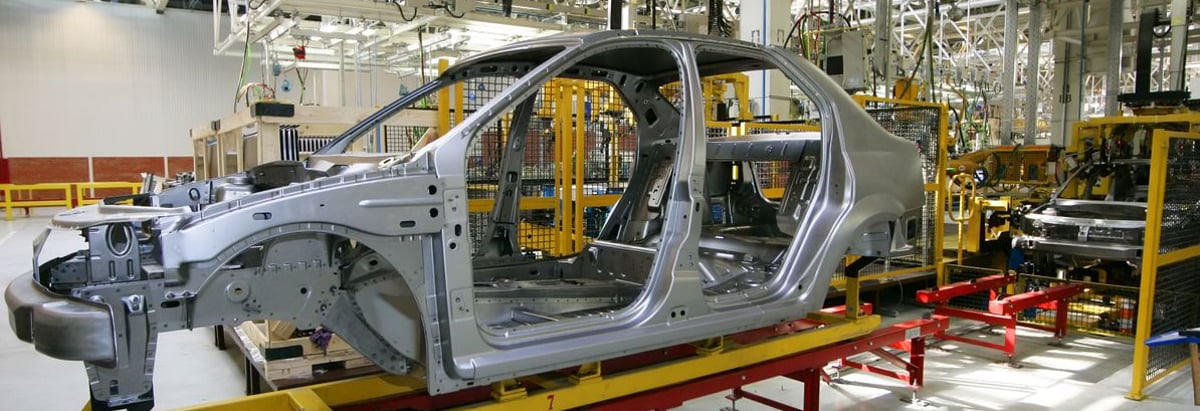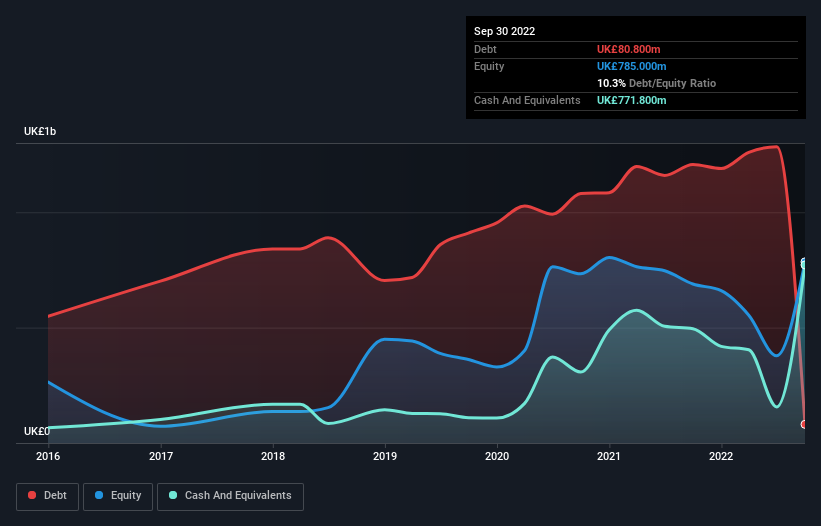- United Kingdom
- /
- Auto
- /
- LSE:AML
Is Aston Martin Lagonda Global Holdings (LON:AML) Weighed On By Its Debt Load?

Some say volatility, rather than debt, is the best way to think about risk as an investor, but Warren Buffett famously said that 'Volatility is far from synonymous with risk.' When we think about how risky a company is, we always like to look at its use of debt, since debt overload can lead to ruin. Importantly, Aston Martin Lagonda Global Holdings plc (LON:AML) does carry debt. But the more important question is: how much risk is that debt creating?
What Risk Does Debt Bring?
Debt and other liabilities become risky for a business when it cannot easily fulfill those obligations, either with free cash flow or by raising capital at an attractive price. If things get really bad, the lenders can take control of the business. While that is not too common, we often do see indebted companies permanently diluting shareholders because lenders force them to raise capital at a distressed price. Of course, the upside of debt is that it often represents cheap capital, especially when it replaces dilution in a company with the ability to reinvest at high rates of return. When we think about a company's use of debt, we first look at cash and debt together.
View our latest analysis for Aston Martin Lagonda Global Holdings
What Is Aston Martin Lagonda Global Holdings's Net Debt?
As you can see below, Aston Martin Lagonda Global Holdings had UK£80.8m of debt at September 2022, down from UK£1.21b a year prior. However, it does have UK£771.8m in cash offsetting this, leading to net cash of UK£691.0m.

A Look At Aston Martin Lagonda Global Holdings' Liabilities
The latest balance sheet data shows that Aston Martin Lagonda Global Holdings had liabilities of UK£1.08b due within a year, and liabilities of UK£1.53b falling due after that. Offsetting these obligations, it had cash of UK£771.8m as well as receivables valued at UK£289.3m due within 12 months. So its liabilities outweigh the sum of its cash and (near-term) receivables by UK£1.55b.
When you consider that this deficiency exceeds the company's UK£1.05b market capitalization, you might well be inclined to review the balance sheet intently. Hypothetically, extremely heavy dilution would be required if the company were forced to pay down its liabilities by raising capital at the current share price. Given that Aston Martin Lagonda Global Holdings has more cash than debt, we're pretty confident it can handle its debt, despite the fact that it has a lot of liabilities in total. There's no doubt that we learn most about debt from the balance sheet. But it is future earnings, more than anything, that will determine Aston Martin Lagonda Global Holdings's ability to maintain a healthy balance sheet going forward. So if you're focused on the future you can check out this free report showing analyst profit forecasts.
In the last year Aston Martin Lagonda Global Holdings wasn't profitable at an EBIT level, but managed to grow its revenue by 13%, to UK£1.2b. That rate of growth is a bit slow for our taste, but it takes all types to make a world.
So How Risky Is Aston Martin Lagonda Global Holdings?
By their very nature companies that are losing money are more risky than those with a long history of profitability. And the fact is that over the last twelve months Aston Martin Lagonda Global Holdings lost money at the earnings before interest and tax (EBIT) line. Indeed, in that time it burnt through UK£427m of cash and made a loss of UK£549m. With only UK£691.0m on the balance sheet, it would appear that its going to need to raise capital again soon. Summing up, we're a little skeptical of this one, as it seems fairly risky in the absence of free cashflow. There's no doubt that we learn most about debt from the balance sheet. But ultimately, every company can contain risks that exist outside of the balance sheet. For instance, we've identified 2 warning signs for Aston Martin Lagonda Global Holdings that you should be aware of.
If you're interested in investing in businesses that can grow profits without the burden of debt, then check out this free list of growing businesses that have net cash on the balance sheet.
If you're looking to trade Aston Martin Lagonda Global Holdings, open an account with the lowest-cost platform trusted by professionals, Interactive Brokers.
With clients in over 200 countries and territories, and access to 160 markets, IBKR lets you trade stocks, options, futures, forex, bonds and funds from a single integrated account.
Enjoy no hidden fees, no account minimums, and FX conversion rates as low as 0.03%, far better than what most brokers offer.
Sponsored ContentNew: Manage All Your Stock Portfolios in One Place
We've created the ultimate portfolio companion for stock investors, and it's free.
• Connect an unlimited number of Portfolios and see your total in one currency
• Be alerted to new Warning Signs or Risks via email or mobile
• Track the Fair Value of your stocks
Have feedback on this article? Concerned about the content? Get in touch with us directly. Alternatively, email editorial-team (at) simplywallst.com.
This article by Simply Wall St is general in nature. We provide commentary based on historical data and analyst forecasts only using an unbiased methodology and our articles are not intended to be financial advice. It does not constitute a recommendation to buy or sell any stock, and does not take account of your objectives, or your financial situation. We aim to bring you long-term focused analysis driven by fundamental data. Note that our analysis may not factor in the latest price-sensitive company announcements or qualitative material. Simply Wall St has no position in any stocks mentioned.
About LSE:AML
Aston Martin Lagonda Global Holdings
Engages in the design, development, manufacture, and marketing of luxury sports cars in the United Kingdom, the Americas, the Middle East, Africa, rest of Europe, and the Asia Pacific.
Reasonable growth potential with mediocre balance sheet.
Similar Companies
Market Insights
Community Narratives



